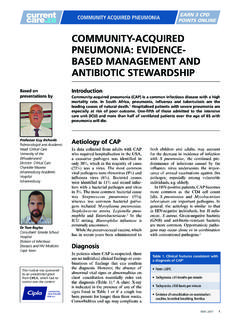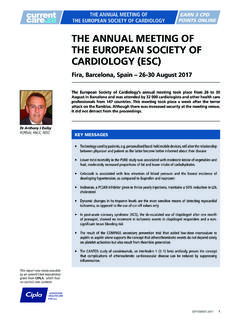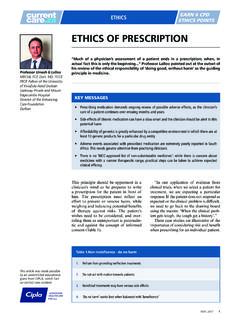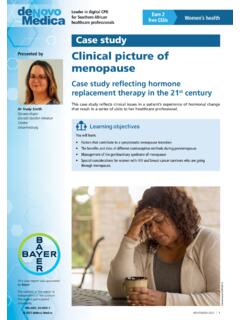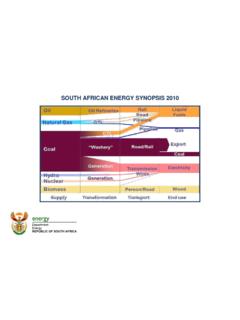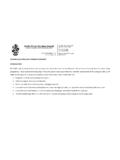Transcription of PiTfAllS in SoUTh AfricAn PrAcTice TodAy - deNovo …
1 1eArn 6 heAlTh lAW ceUsHEALTH LAWAUGUST 2017Dr Volker HitzerothPsychiatrist Medicolegal Adviser at Medical ProtectionThis report was made possible by an unrestricted educational grant from CIPLA, which had no control over Malpractice litigationPiTfAllS in SoUTh AfricAn PrAcTice TodAy Even if you are among the world s best physicians, litigation and HPCSA complaints don t go any patient can sue or complain about anyone and anything; and they do. Dr Volker Hitzeroth, commenting on the complex medicolegal web of clinical PrAcTice in SoUTh AfricaintroductionSouth Africa has witnessed a sharp increase in medical malpractice litigation. This increase has been ascribed to a number of factors, including normalisation to global trends, increasing public awareness of patient rights and deliberate targeting of the public by medical malpractice in addition to an increased number of clinical negligence complaints, the value of financial compensation claims is rising significantly.
2 Technological advances and increased life expectancy affect claim size, particularly for catastrophic claims such as birth defects and brain Most of these increases have been seen in the riskier specialties such as obstetrics, spinal surgery, neurosurgery and negligence is a legal concept. it does not necessarily mean neglect or wilful misconduct, but a failure to attain a reasonable standard of care. if a doctor s management of the patient is considered reasonable by a responsible body of peers, a court would be unlikely to find him or her guilty of negligence. in cases of negligence, the only remedy available in law is financial compensation. Before damages are payable, however, the claimant must prove that they were owed a duty of care, that there was a breach of that duty of care and that damage was suffered as a KeY MeSSageS A sharp increase in both the number and value of negligence claims has occurred in SoUTh Africa Even if not directly responsible for an adverse incident, all members of the health care team may face medicolegal consequences Common SoUTh AfricAn medicolegal problems have arisen from failure to appreciate legal responsibilities, problems with clinical management, systems and resourcing, and failure of communication Common triggers for malpractice complaints in SoUTh Africa include billing and account issues.
3 Manner and attitude, disparaging colleagues, and communication gaps in handover to colleagues Comprehensive record-keeping is essential and is the best defence in any malpractice litigation Medical malpractice litigation may have many negative consequences for the individual practitioner and the health care LAW2 AUGUST 2017earn from 3 CPD points on Accredited CPD modules .Patients and doctors tend to approach a consultation with markedly different agendas, a situation that can easily lead to misunderstandings, frustration and disappointment unless the needs of each party are met. Disappointed patients are far more likely to sue when the outcome of clinical care fails to meet At the sixth annual congress of the Faculty of Consulting Physicians of SoUTh Africa (May 2017), Dr Volker Hitzeroth discussed the current local con-text of medical malpractice litigation.
4 He considered the role of the specialist con-sultant physician in a patient s journey as part of a greater health network. From a referring GP in the commu-nity, the patient travels to an ER centre at a hospital, to the admission ward, to the consulting physician. The physician consults with pathologists, radiologists and other colleagues. The patient is then discharged and followed up. An adverse incident anywhere along the path of this journey may have medicolegal implica-tions for any, or all, of those who were involved with the management of the patient, even if not directly responsible or even present at the time of the incident. common medicolegal problems in SoUTh Africa According to the Medical Protection Society (MPS), most incidents giving rise to medicolegal problems in SoUTh Africa fall into one of four to appreciate legal and professional responsibilitiesKey responsibilities of a health care prac-titioner at all times: Act in the best interests of patients; Respect patient confidentiality, pri-vacy, choices and dignity; Maintain the highest standards of per-sonal conduct and integrity; Provide adequate information about the diagnosis, treatment options and alternatives, costs associated with each, and any other pertinent informa-tion to enable the patient to exercise a choice in terms of treatment and informed decision-making.
5 Keep professional knowledge and skills up to date; Maintain proper and effective com-munication with patients and other professionals; Except in an emergency, obtain informed consent from a patient or, in the event that the patient is unable to provide consent for treatment, from the patient s next of kin; and Keep accurate patient in clinical management Do not deviate from accepted PrAcTice embodied in evidence-based guide-lines unless there are very good rea-sons for doing so. These reasons must be documented contemporaneously in the medical record; Do not undertake tasks beyond your competence, unless emergency inter-vention is required and you are the only (or most experienced) doctor available; Ensure that sufficient help and equip-ment are available for any procedure undertaken, and for the management of all foreseeable complications.
6 Medication errors are commonly caused by inadequate knowledge of patients and their clinical conditions, inadequate knowledge of medication, calculation errors, illegible handwrit-ing on prescriptions, confusion regard-ing the name of the medication and poor and resourcing problemsThe most common systems failures are: Failure to pass on important information; Failure to arrange appointments, investigations or referrals with the appropriate degree of urgency; Failure to review the results of investigations; Failure to arrange follow-up and monitoring; Mislabelling, misfiling and failure to check failureKeeping people informed in the inter-ests of continuity of care must be bal-anced against the need to maintain HEALTH LAW3 AUGUST 2017earn from 3 CPD points on Accredited CPD modules.
7 Confidentiality, and both these issues should be borne in mind when sharing relevant information about patients. Issue clear and unambiguous instructions when prescribing medication to be adminis-tered by other members of the health care team and document the administration of drugs and infusions (name, time, dose). common triggers for SoUTh AfricAn malpractice complaints Dr Hitzeroth has formulated a list of trig-gers for problems he commonly encoun-ters in the SoUTh AfricAn and account issuesOne of the most important aspects of a PrAcTice is the billing department, which is very commonly neglected. Account disputes may trigger a malpractice claim, particularly if the patient is unhappy or dissatisfied and perceives the problem as remaining unresolved.
8 Ensure billing is in order. Respond to problems as soon as and attitudeDuring a consultation, be aware of your words, manner and attitude while interacting with the patient, including any physical contact during an examina-tion. Always follow up calls, messages and requests for meetings and make compre-hensive notes. Ensure administrative staff are aware of the appropriate manner for and requirements of patient interactions. Disparaging colleaguesDon t disparage colleagues. Always be honest and objective. If you don t know the facts, say that you don t know the gaps in handoverEnsure that the handover is not rushed, with properly documented to PrAcTice When we hear facts that challenge us, we selectively amplify what suits us, ignore what does not and reinterpret whatever we can.
9 4 Dr Hitzeroth presented a number of fic-tional examples of common scenarios that might occur in medical PrAcTice in SoUTh Africa, with specific learning points, to highlight the common litigation PiTfAllS of informed consent, consultation with colleagues and recording of all con-tacts (See cases 1-7).Informed consentSouth Africa s National Health Act obliges practitioners to tell patients of the range of diagnostic procedures, treatment options, risks, costs and consequences of each in a language the patient understands and that takes into account their level of literacy. This also includes the right to refuse health services and an explanation of the implications, risks and obligations of refusal. It is also necessary to consider a patient s expectations.
10 Many claims and complaints arise from patients feeling disappointed as a result of an experience or outcome being different from what they were expecting. Document the sub-stance of these interactions, including the date, time and who was with colleaguesDocument the substance of consultation sessions with colleagues (formal, infor-mal, academic ward rounds, weekend handover), including the date, time and who was all contactsDocument the substance, date, time of and participants in all contacts: nursing instructions, telephone calls, ER referrals and follow-up of urgent test and screen-ing requests, family contacts and ward rounds. Clear, objective and contemporaneous HEALTH LAW4 AUGUST 2017earn from 3 CPD points on Accredited CPD modules.
